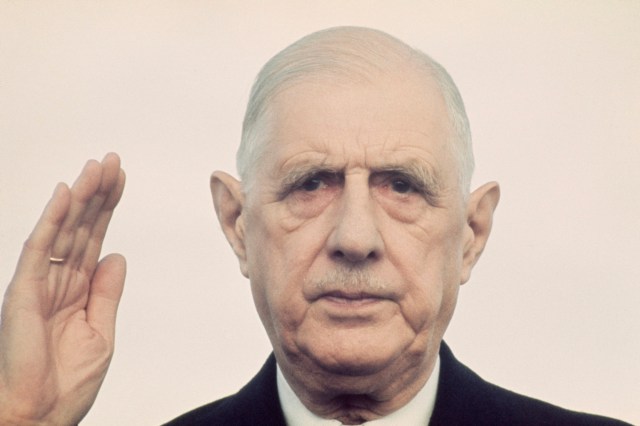Credit: Henri Bureau/Sygma/Corbis/VCG via Getty Images

It was a fine winter’s day and I was on a ferry, heading back home to England. Even from Calais, the White Cliffs of Dover were shining in the sunlight, seemingly near enough to touch. Not for the first time, I thought about the difference that a narrow stretch of sea can make.
Dover and Calais are just 21 miles apart. And yet culturally the former is closer to Inverness and latter closer to Marseilles. Much closer. Cross the Channel and you’re in different world. With a British father and a French mother, I feel qualified to generalise, because that’s what countries are: generalities. Yes, each is a grab-bag of language, custom and history, over-flowing with complications – and yet each is obviously distinct from the other grab-bags, even the neighbouring ones.
In one sense, borders are abstractions (unless dictated by physical geography). But the countries within them are real – as real as anything that people make, or that is made of people. It’s therefore legitimate to ask questions about their purpose.
One possible answer is that countries aren’t for anything – other than serving the various individual interests of their own citizens. They should do that, of course – but we must also recognise the collective agency of the nation as a whole. It’s all very well drawing Michael Oakeshott‘s theoretical distinction between an “enterprise association” (a state that organises its people in the service of a common purpose) and a “civil association” (a state that mainly exists to facilitate, and arbitrate between, the personal goals of its individual members), but in reality it’s difficult for a country, especially a rich country with a half-way competent system of government and strong institutions, not to have some collective impact upon the world.
Whether one sees this in terms of a top-down national endeavour or bottom-up, individual decision-making, the fact is that every country will make a particular contribution to the course of human history – especially those with the strongest sense of identity. It seems entirely appropriate that the democratic process should have some influence on what that contribution should be – and to the extent that it does, we can speak of each country having a national purpose.
Charles de Gaulle was in no doubt about that – at least not when it came to his own country. He began his memoires with these famous words:
“Toute ma vie, je me suis fait une certaine idée de la France.”
This is normally translated as “All my life, I have had a certain idea of France”. It’s a fair, though rather flat, rendering of the original – and one that makes him sound fussy and narrow-minded. A better rendering might be: “in the course of my life I have come to understand a true vision of France.”
The paragraph ends with the words “France cannot be France without greatness”. Again that might sound like arrogance, but actually it’s an acceptance of responsibility and fallibility. The Biblical saying goes, “that to whom much has been given, much will be expected”. De Gaulle saw that a country with as rich a natural and cultural inheritance as France could only be a great success or an exemplary failure – with any mediocrity being a perverse anomaly.
In other words, De Gaulle understood that France ought to be a great nation, but its greatness couldn’t be taken for granted.
A Certain Idea of France is the title of a well-received new biography of the former French president by Julian Jackson. Ross Douthat wrote an excellent piece about it for the New York Times.
He emphasises the extent to which De Gaulle’s vision of French greatness was also a unifying one:
“…his only consistent purpose apart from his own ambition, was a struggle to reintegrate the competing narratives of Frenchness, to get his country to transcend its ideological civil war…
“…his extreme devotion to a ‘certain idea of France,’ made him constantly inclined to seek a more inclusive nationalism — one that would lionize the military heroes of the ancien régime and the generals of the revolutionary period equally, let Joan of Arc live beside Marianne, and enable Paris’s jostling, rivalrous monuments, Catholic and Bourbon and Republican and Bonapartist, to share the city rather than dividing it.”
Though he acknowledges that – in the era of Macron versus Le Pen – old wounds are re-opening in France, Douthat says that America is another polarised nation in need of a Gaullist vision:
“…it’s possible for a very unusual sort of politician to effectively reinvent tradition, synthesize from conflict, and persuade many millions of people to go along with it.
“And it also suggests the importance of a Gaullist question for our would-be leaders: What is your certain idea of America? And how many Americans, and how much of American history, would your idea be able to include?”
It’s become very clear that Britain too needs its own de Gaulle (ironically, since it was the man himself who did so much to exclude the UK from the Franco-German leadership of Europe, thus laying the foundations for Brexit). Though we’ve seen how politicians can prosper by exploiting division, we’ve also seen how this gets a nation nowhere. When the sides are evenly matched, polarisation ultimately leads to stagnation.
Thus what we need now is a leader who can articulate a unifying vision of national greatness and responsibility for a UK outside of the EU.
Let’s see if Boris and his rivals can rise to the challenge.










Join the discussion
Join like minded readers that support our journalism by becoming a paid subscriber
To join the discussion in the comments, become a paid subscriber.
Join like minded readers that support our journalism, read unlimited articles and enjoy other subscriber-only benefits.
Subscribe